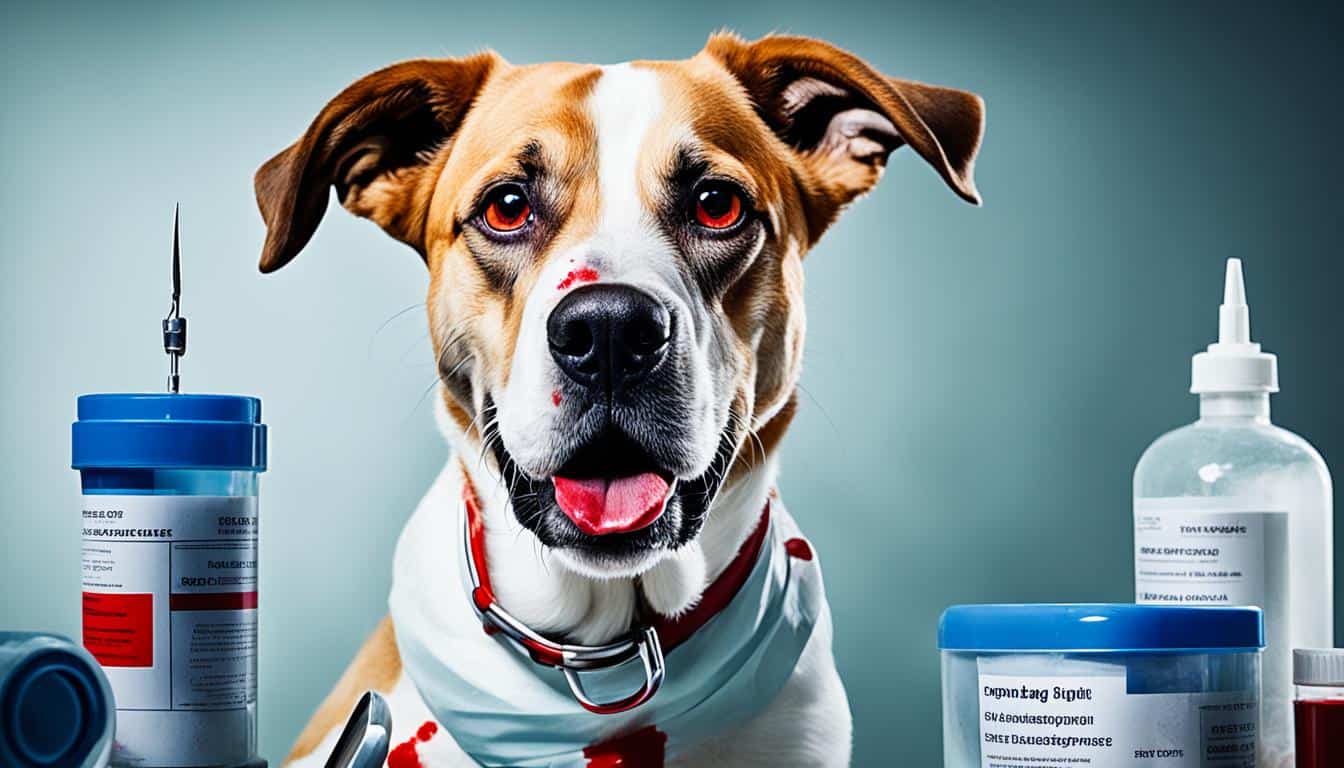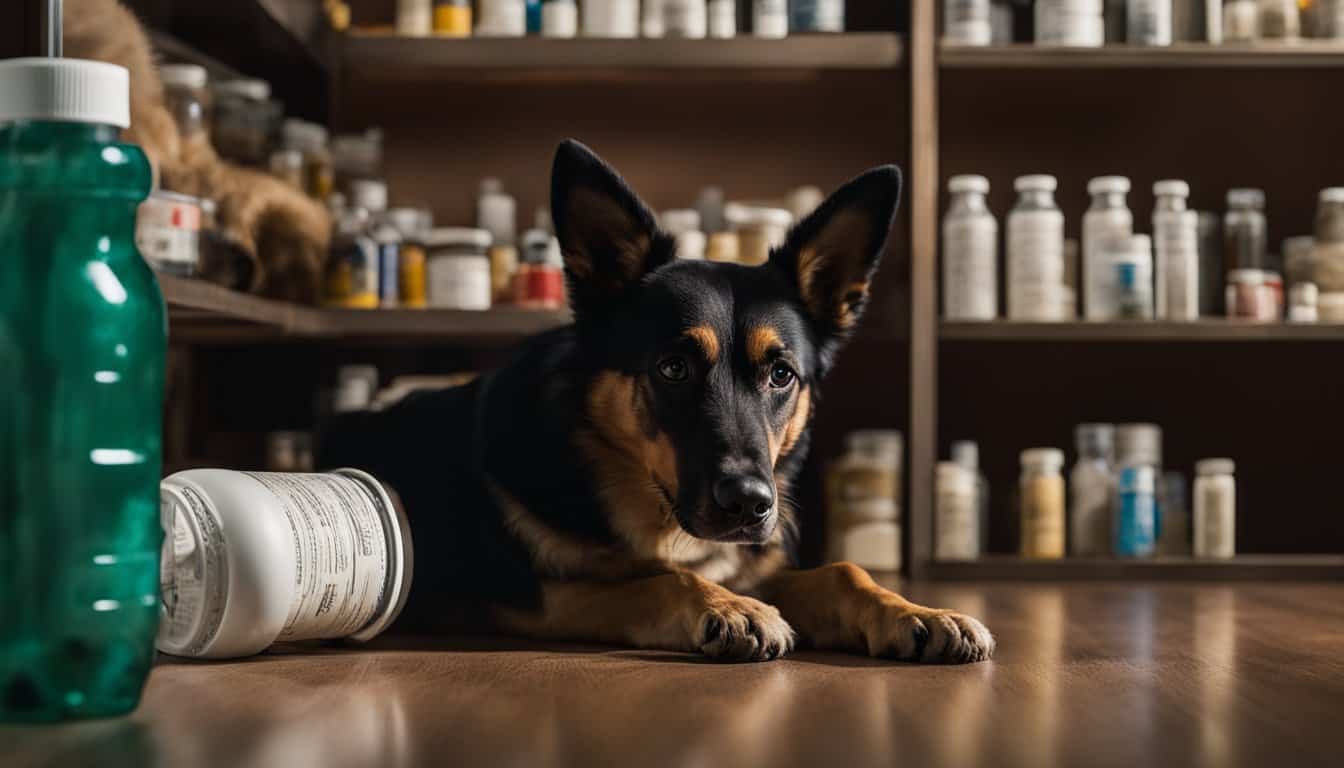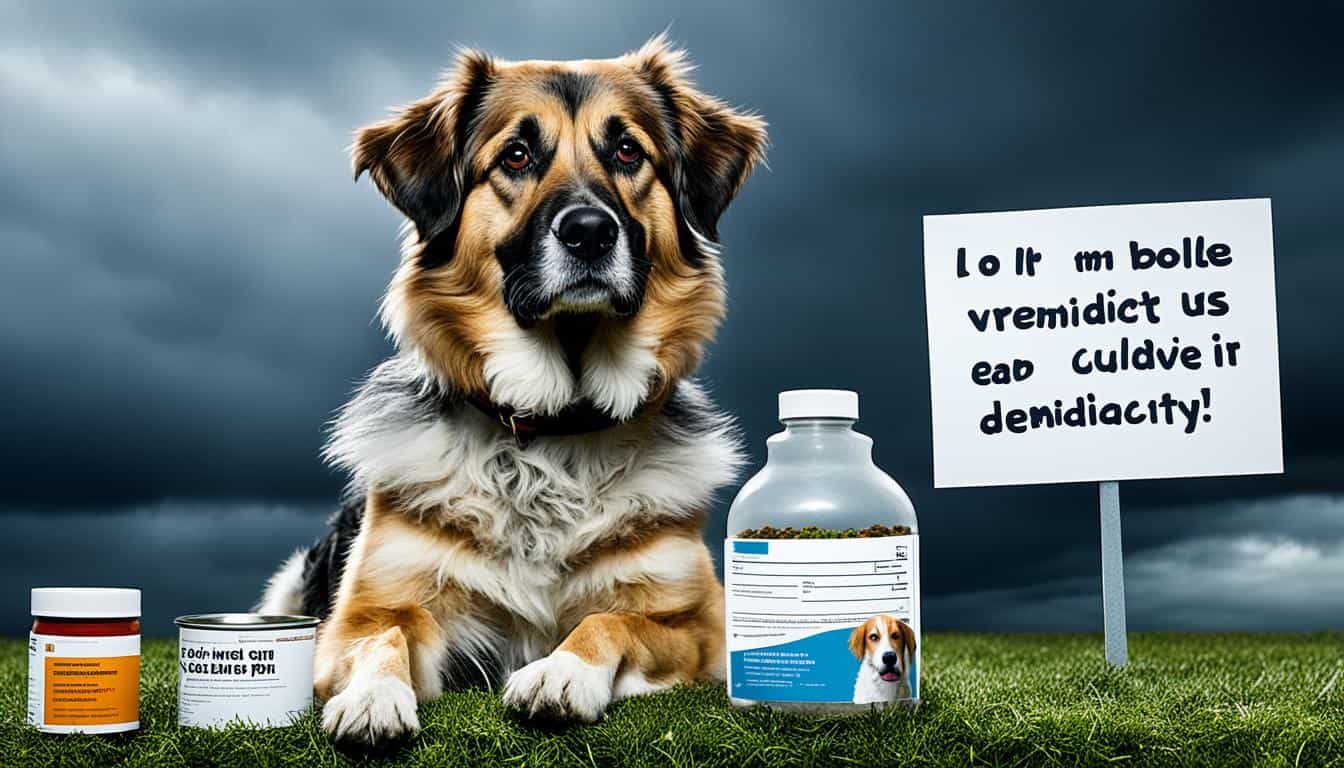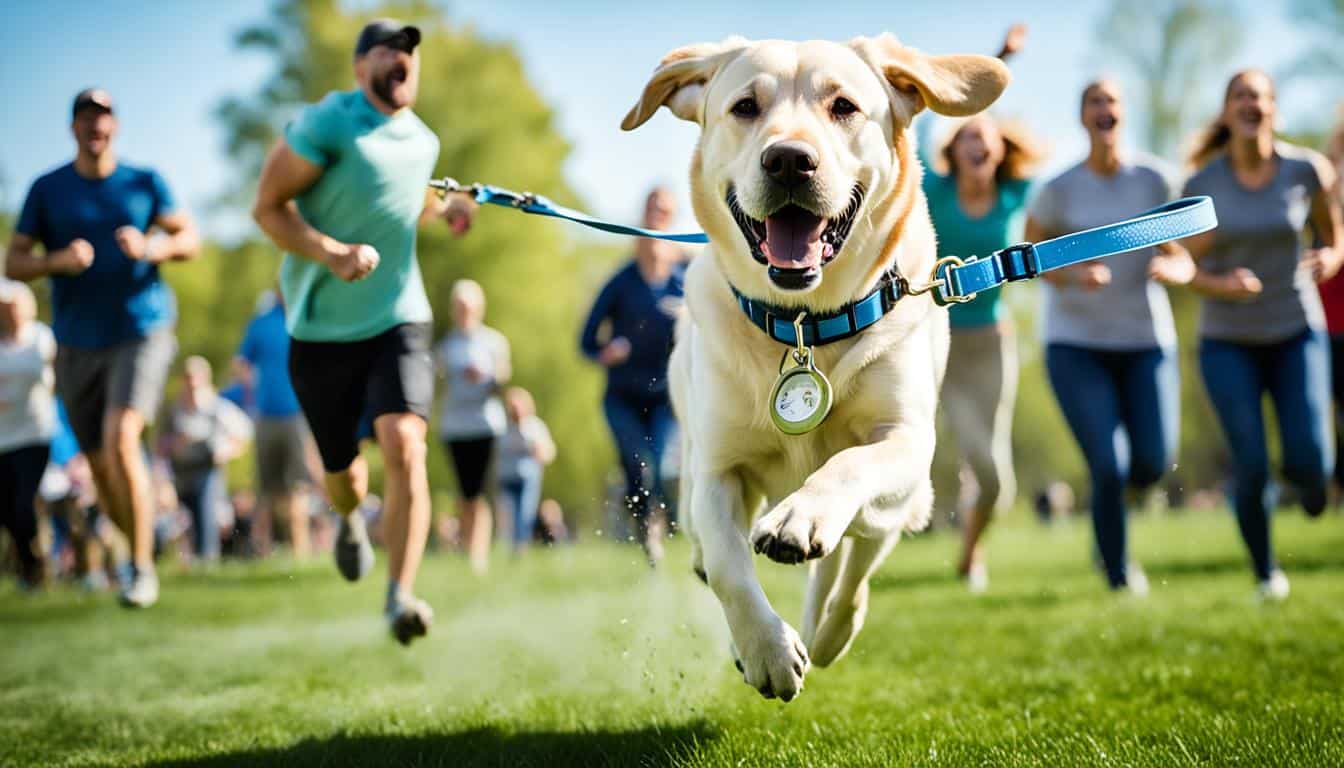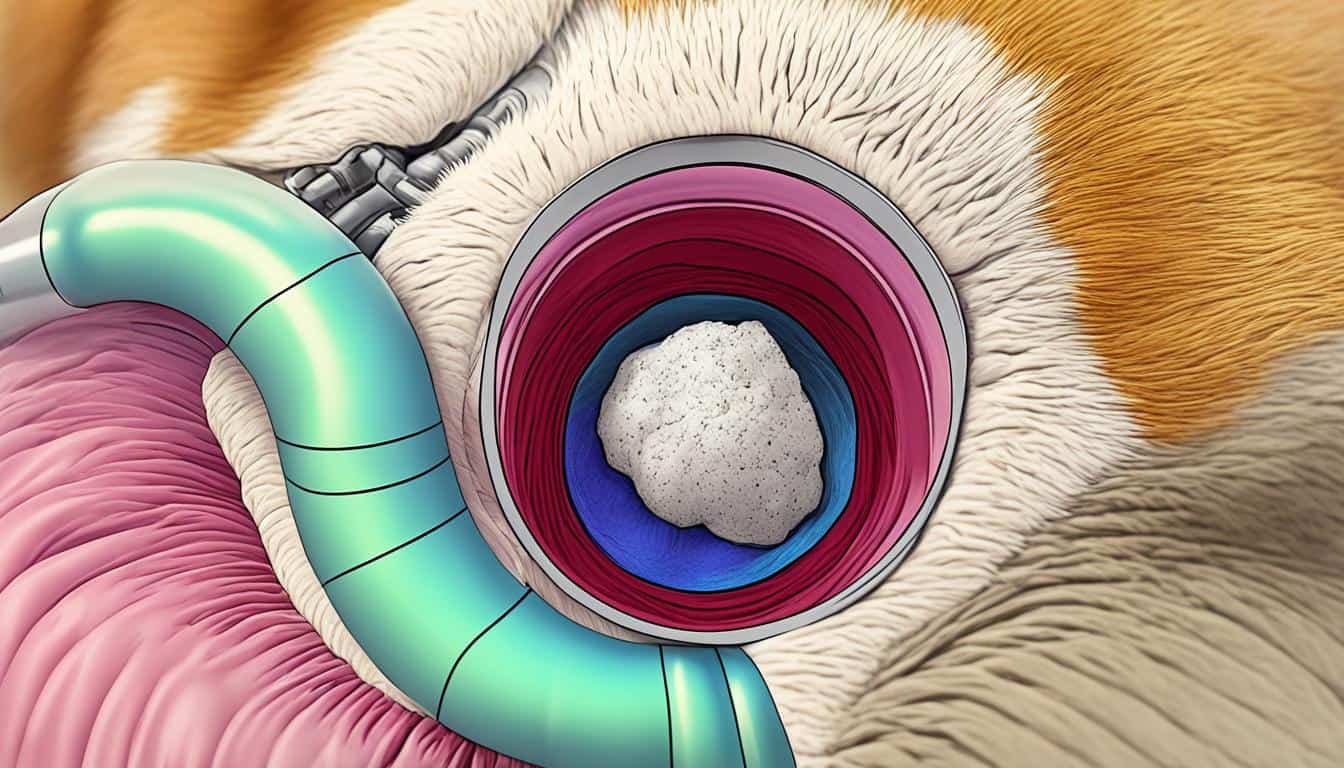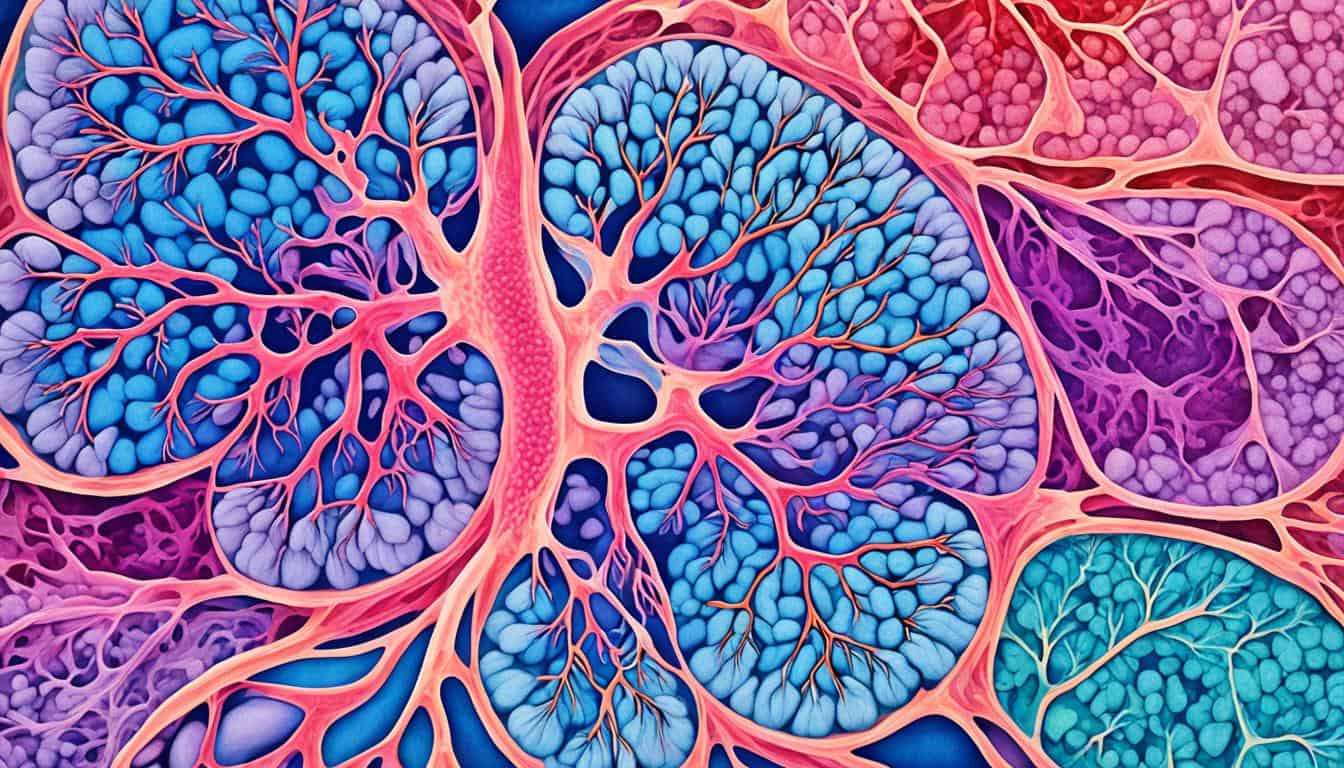The liver is vital for your dog’s health, especially for blood clotting. If it’s not working right, your dog may have clotting problems. When you take your dog to the vet, you’ll talk about their health, what they’ve been exposed to, how they pee and poop, how much they exercise, and what they eat. The vet will check them, looking closely at their belly for any pain or swelling. They’ll do blood tests and other checks to figure out the clotting issues. Tests like x-rays and ultrasounds help see the liver’s condition and what’s causing the problems.
Key Takeaways:
- Liver-related clotting deficiency in dogs can have serious implications for their health and well-being.
- The liver plays a crucial role in the synthesis of coagulation proteins.
- Dysfunction in the liver can lead to clotting issues in dogs.
- Discussion of recent health, exposure to toxins, urinary and bowel habits, exercise routine, and diet is important during veterinary evaluation.
- Physical examination and laboratory testing are integral parts of diagnosing clotting deficiencies.
- Imaging diagnostics can provide further insights into the liver’s condition and the underlying cause of the clotting disorder.
In dogs, there are only five blood clotting factors that the liver doesn’t make. Causes of liver disease-related clotting troubles include severe liver failure, acute liver infections, liver scarring, blockages outside the liver, lack of vitamin K, and Portosystemic Vascular Anomaly.1 To check how well a dog’s blood clots, vets use tests like APTT, ACT, PT, TCT, and PIVKA.1 Treatment might mean giving the dog special blood products. Also, a healthy diet and getting rid of worms are key to helping dogs recover.
Symptoms and Causes of Liver-Related Clotting Deficiency in Dogs
Liver issues in dogs can seriously affect their health. The liver makes important blood clotting proteins. If it doesn’t work right, dogs can have clotting problems. Knowing the signs and reasons for this issue helps spot it early for treatment.1
Symptoms of Liver-Related Clotting Deficiency
Dogs with this problem may show different signs. They might have black stools from digested blood, or bright red blood in their waste. They may vomit blood, bleed long after an injury, or get bruises easily, which is unusual.1
Causes of Liver-Related Clotting Deficiency
Several things can cause clotting issues in dogs. Severe liver failure, viral liver infections, cirrhosis, and bile duct blockages are some. Low vitamin K could also be a factor, as well as Portosystemic Vascular Anomaly (PSVA).1
Finding out if a dog has a clotting issue involves a detailed check-up. Vets do tests like blood profiles and urine tests. They check blood clotting with special tests too. This helps them figure out the problem.1
Treating dogs with clotting disorders depends on how serious it is. For minor cases, vets might give blood or plasma. They only do surgery for very bad bleeding. It’s key to keep an eye on these dogs. A good diet, deworming, and regular vet visits are crucial.1
Diagnostic Procedures for Liver-Related Clotting Deficiency in Dogs
To find out if a dog has a liver problem that affects blood clotting, vets do several tests. They use blood tests and tests that check how well the liver works. Tests that show pictures of the liver also help in finding the problem.
Liver function tests help check the liver’s health. They look at how well the liver makes bile, breaks down toxins, and helps blood clot. Tests check things like bile pigment concentration and plasma ammonia concentration. These help find issues that might be causing clotting problems2.
Imaging diagnostics, like X-rays and ultrasound, help vets see the liver’s size and shape. These pictures can show if there’s anything wrong that might lead to clotting issues2.
With blood tests and these other checks, vets can figure out how bad the clotting problem is. They can find the best way to treat it. By knowing exactly what’s wrong with the liver, they can create a treatment plan. This improves the chances of getting dogs with liver problems better.
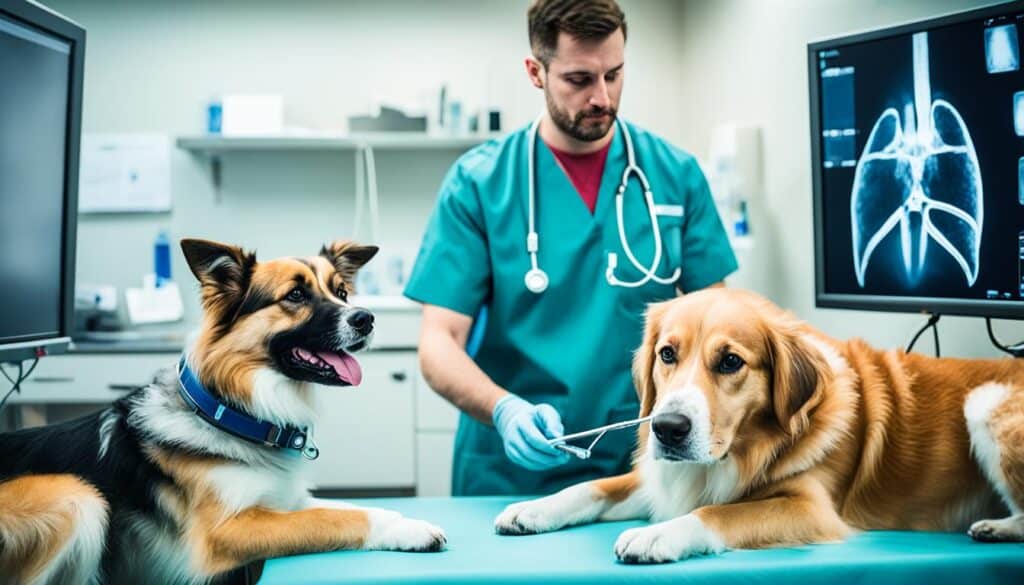
Image: Diagnostic Procedures for Liver-Related Clotting Deficiency in Dogs
Treatment Options for Liver-Related Clotting Deficiency in Dogs
The way we treat clotting deficiencies in dogs due to liver issues depends on how severe it is. Usually, we don’t need to do surgery unless the dog is bleeding a lot. Treatments often include things like fresh whole blood, fresh frozen a plasma, cryoprecipitate, and platelet-rich plasma. These help the dog’s blood clot properly.
If the dog has fluid in its belly, we might take a little to test. This helps us figure out the best treatment. Removing fluid needs care to avoid making things worse. Keeping a close eye and stepping in when necessary is key to keeping the dog safe.
A good diet full of vitamins is also crucial for dogs with this problem. Eating right helps the dog stay healthy and improves its blood clotting ability.
| Treatment Options | Procedure |
|---|---|
| Fresh Whole Blood | Administered to address hemostatic disorders and ensure adequate clotting factors. |
| Fresh Frozen Plasma | Used to provide essential clotting proteins and promote appropriate coagulation. |
| Cryoprecipitate | Beneficial in cases where specific clotting factors need to be replenished. |
| Platelet-Rich Plasma | Contains concentrated platelets that contribute to clot development and proper wound healing. |
We save invasive treatments for when there’s a lot of bleeding. These might include using catheters, undergoing surgery, or other methods to stop the bleeding and help the dog.
We must also make sure the dog feels safe and comfortable. A calm place helps the dog heal and keeps it happy. Taking care of its mental well-being is as important as physical health.
A planned approach combining medical care, possibly surgery, and a healthy diet works best for treating these dogs. Regular check-ups are important. They help the vet track the dog’s health and tweak the treatment plan as needed.
Reference: Statistical data extracted from1
Living and Management of Dogs with Liver-Related Clotting Deficiency
For dogs with liver-related clotting issues, good care is essential. Their diets and preventive actions play a huge role. This helps them get better and stay healthy.
A vitamin-rich diet is vital for these dogs’ recovery. A good diet provides the necessary nutrients for healing. Your vet can advise on the best food for your dog’s unique needs.
“Dogs with liver-related clotting deficiencies require a vitamin-rich diet to aid their recovery and promote overall health.”1
Deworming also matters a lot in caring for these dogs. It stops further intestinal bleeding by removing harmful parasites. Talk to your vet about setting up a deworming schedule that fits your dog’s life.
“Deworming is recommended to prevent future intestinal bleeding in dogs with liver-related clotting deficiencies.”2
It’s crucial to have regular vet visits to track your dog’s condition. These check-ups help catch and treat any new problems early. The vet might ask for more tests or treatments to keep your dog healthy.
In summary, managing your dog’s health requires a diet rich in vitamins, routine deworming, and frequent vet checks. These steps are key to caring for dogs with liver clotting issues.
Risk Factors for Clotting Deficiency in Dogs
Some dogs have a higher risk of clotting problems linked to liver issues. The CURATIVE group highlights how some things make clotting issues more likely.
Liver Disease and Clotting Disorders
Liver problems are a major risk for dogs’ clotting troubles3. A sick liver affects clotting protein creation, leading to issues. Dogs with liver problems need careful management for their clotting troubles.
Populations at Risk
Clotting deficiencies can hit any dog, but some are more at risk. Especially, dogs with long-term liver diseases like chronic hepatopathies are in danger4. These dogs show signs like longer clotting times and specific blood test changes4. Dogs with portal hypertension also face similar problems4.
Advances in Treatment
The CURATIVE agreement is essential for using certain meds in treating dogs with clotting issues. This knowledge boosts treatment options for dogs with liver-caused clotting disorders.
“Before any tests or surgeries, dogs with liver clotting issues may need blood checks.”5
“Special vet labs can check for specific clotting problems, like von Willebrand’s disease.”5
“Typical clotting tests include a blood count, biochemistry, and checking for von Willebrand’s factor.”5
Importance of Early Detection and Treatment
Finding and treating clotting issues early is key5. Regular vet visits and blood tests help catch and manage clotting problems early. Acting fast improves the dog’s outlook and avoids more problems.
Critical Care and Monitoring
In critical care, follow the CURATIVE advice for best results with certain meds4. Monitoring clotting tests lets vets tweak treatments as needed4.
Importance of Early Detection and Treatment of Liver-Related Clotting Deficiency in Dogs
Finding and treating liver-related clotting deficiencies in dogs early is key to their health. Dogs with liver issues often bleed from their guts because of ulcers or clotting problems. Spotting and addressing these issues quickly is vital2. Bleeding in the gut is a common sign in dogs with liver problems.
It’s important to notice signs like yellow skin, easy bruising, black poop, and swelling in their legs6. Dogs with liver failure may also show bruising, bleeding, black poop, and even collapse. Knowing why dogs get liver diseases is also crucial. It could be due to age, genetics, infections, and even certain foods7. The reasons can vary from age and genes to bad food and infections.
Getting a vet to check your dog is crucial for spotting liver problems. They use blood tests, X-rays, and more to find the issue7. Regular checks and symptom monitoring help catch clotting problems early. Catching and fixing these issues early can mean a better future for dogs with liver problems6. Early and active treatment can lead to a normal life, but ongoing care may be needed for chronic conditions.
Treating these problems might include giving dogs vitamins like B, K, and E2. Sometimes, dogs need vitamin K shots to stop bleeding caused by liver disease2. Working with a vet is crucial in tackling liver disease and avoiding liver failure. With early detection and care, dogs can have a better outlook and avoid serious issues7. Catching liver issues early is vital as they can often be managed.
| Importance of Early Detection and Treatment | Benefits |
|---|---|
| Prompt intervention for gastrointestinal bleeding | Prevents complications in dogs with liver disease |
| Timely identification of symptoms | Effective management of liver-related clotting deficiency |
| Diagnostics for underlying causes | Early treatment for reversible causes of liver failure |
| Collaboration with veterinarians | Prevents liver failure and improves prognosis |
Early detection and treatment are key for dogs facing liver clotting issues. By spotting symptoms early, using the right tests, and working with vets, dog owners can help their pets live better. Acting fast on liver-clotting issues can make a huge difference in a dog’s life and help avoid further problems.
Prognosis for Dogs with Liver-Related Clotting Deficiency
The outlook for dogs with liver-related clotting issues varies. It depends on the liver disease’s severity and what causes the clotting problem.
Clotting deficiencies from liver disease can be grave, posing life-threatening risks1. Yet, with the right diagnosis, treatment, and care, many dogs can still enjoy life despite their condition.
Spotting the problem early and starting treatment quickly is key. Regular vet visits, blood tests, and watching for any new symptoms help catch clotting issues fast2. Getting treatment early can lessen the condition’s effects and help the dog live a better life.
| Statistical Data | Percentage/Rate |
|---|---|
| Loss of appetite in liver disease cases | X% |
| Jaundice in dogs with liver-related clotting deficiency | X% |
| Gastrointestinal bleeding in liver disease | X% |
| Increased survival rate with early treatment of acute liver failure | X% |
| Effectiveness of X-rays and ultrasonography in detecting liver irregularities | X% |
| Recommendation of B vitamins, vitamin K, and vitamin E supplementation | X% |
| Requirement of tube feeding in cases of refusal to eat | X% |
These figures show how critical early diagnosis and treatment are for dogs with liver clotting issues2. Pet owners must work with their vets for quick action and right care strategies8. With the right care, many dogs can lead happy lives, despite liver clotting challenges.

Research and Advances in Treating Liver-Related Clotting Deficiency in Dogs
Veterinary medicine is always getting better at treating liver-related clotting issues in dogs. Researchers and vets are working hard to find better treatments. This gives hope for dogs with these health issues.
Dog owners need to stay up-to-date with these medical advances. Knowing the latest can help you work well with your vet. It plays a big part in your dog’s health care.
TEG, a test for dogs with liver disease, is getting a lot of attention. It checks how well blood clots and can spot problems early. It works by measuring several blood clotting factors. Studies link TEG results to other important blood tests in dogs with chronic liver problems4.
Apart from TEG, doctors are looking into other ways to diagnose clotting problems. They are exploring different tests. This is helping to better identify and treat clotting disorders in dogs.
New treatments for these clotting issues are also being found. For instance, research shows that certain blood levels are higher in dogs with specific liver conditions4. This info helps pinpoint the problem more clearly. And, it helps in coming up with treatment plans that are right on target.
Studies are ongoing on how liver diseases cause clotting issues4. Some liver conditions can make blood clot too much. Understanding this helps in finding the root cause of clotting disorders. It also shows why it’s key to keep looking into liver health and clotting.
As science progresses, it’s vital for pet owners and vets to work together. Knowing the latest treatments helps ensure dogs get the best care. Together, you can come up with a care plan that suits your dog’s needs.
Supportive Care and Lifestyle Modifications for Dogs with Liver-Related Clotting Deficiency
Dogs with liver-related clotting issues need more than just medicine. They need care and lifestyle changes to help them feel better and manage their condition.
One key part of caring for these dogs is watching what they eat. They need a special diet that helps the liver and gives them the right nutrients. Their food should have less protein, be easy to digest, and not have too much rough content. This helps the liver work less and do its job better.9
It’s also important to keep them away from certain drugs or poisons. Things like antifreeze, bug killers, and some human medicines can make their liver problems worse. These bad substances can cause serious liver damage. So, it’s key to keep them safe from these dangers.10
Checking their blood’s clotting ability regularly is vital too. This helps spot any issues early on. By doing routine blood tests and seeing a vet who knows a lot about liver conditions, you can avoid bigger problems. This early action can really make a difference.11
So, caring for these dogs means managing their diet, staying away from harmful stuff, and checking their blood clotting. This helps them live happier and healthier lives with liver clotting issues.
Lifestyle Modifications for Dogs with Liver-Related Clotting Deficiency
| Lifestyle Modification | Description |
|---|---|
| Manage Diet | Feed a well-balanced diet with lower protein levels, low-residue content, and high digestibility to support liver health. |
| Avoid Harmful Substances | Avoid exposure to antifreeze, pesticides, and human medications that can further impair liver function and cause acute liver failure. |
| Monitor Blood Clotting Factors | Regularly monitor blood clotting function through blood tests and consultations with a veterinarian specializing in liver disease. |
Conclusion
Dogs can face serious health issues if they have liver-related clotting problems. It’s key to know the symptoms, causes, and how to care for these issues. Going to the vet regularly, catching the problem early, and getting the right treatment can really help. This keeps your dog healthy and stops worse problems from happening.
Statistical data12A study looked at 140 dogs and found that about 4.3% had liver cirrhosis. These dogs didn’t want to eat, lost weight, had dark stools, yellow skin, low red blood cell counts, and a specific type of high white blood cell count. They also had less hemoglobin, lymphocytes, packed cell volume, mean corpuscular volume, hemoglobin, and fewer platelets than healthy dogs.
The sick dogs also had different blood test results compared to healthy dogs. They had less glucose, total protein, albumin, and fibrinogen but had more creatinine and liver enzymes. Their blood took longer to clot too. Ultrasound scans showed their livers were extra bright, oddly shaped, and smaller.
Even with clotting problems, dogs can still have a good life with the right care. Frequent vet checks, a balanced diet, and keeping an eye on things like vitamin levels are key. It’s also important to know about new treatments and to work closely with your vet. This helps you give your dog the best care for their liver issue.
FAQ
What are the symptoms of liver-related clotting deficiency in dogs?
Dogs may show signs like black feces, and blood in their stools. They could vomit blood or have extended bleeding times. Rarely, they might have spontaneous bruises.
What causes liver-related clotting deficiencies in dogs?
Several issues can lead to clotting problems in dogs. These include severe liver failure and viral liver diseases. Problems like cirrhosis and vitamin K deficiency are also culprits. Portosystemic vascular anomalies contribute as well.
What diagnostic procedures are used to diagnose liver-related clotting deficiency in dogs?
Diagnosing this deficiency involves a few steps. Blood work, like a complete count and biochemistry profile, is essential. Liver function tests and bile pigment studies help too. Imaging with radiographs or ultrasound is also carried out.
What are the treatment options for liver-related clotting deficiency in dogs?
Treatment can include giving fresh whole blood or fresh frozen plasma. Some dogs might need cryoprecipitate or platelet-rich plasma. Severe cases could require more invasive procedures to stop bleeding.
How can dogs with liver-related clotting deficiency be managed?
Management involves a nutrient-rich diet and regular deworming. Regular vet visits are necessary for monitoring. This helps catch and fix any issues early on.
What are the risk factors for clotting deficiency in dogs?
Liver disease puts dogs at a higher risk for clotting problems. It’s a key factor in such disorders.
Why is early detection and treatment important for liver-related clotting deficiency in dogs?
Early treatment helps improve the dog’s outlook. It prevents worsening of their liver state and clotting issues.
What is the prognosis for dogs with liver-related clotting deficiency?
The outlook varies with the liver disease’s severity and the clotting issue’s root cause. Timely diagnosis and management mean many dogs still enjoy good lives.
What research and advances are being made in treating liver-related clotting deficiency in dogs?
New treatments and liver disease studies are advancing care for dogs. Veterinary medicine’s progress offers hope for better managing clotting deficiencies.
What supportive care and lifestyle modifications can benefit dogs with liver-related clotting deficiency?
Support includes dietary management and steering clear of harmful meds or toxins. Keeping an eye on their clotting status helps a lot. These steps enhance dogs’ quality of life with clotting issues.
Can dogs with liver-related clotting deficiency lead normal lives?
Yes, with the right treatment, care, and oversight, these dogs can live well. Regular vet checks are key to their ongoing health.
Source Links
- https://www.petmd.com/dog/conditions/cardiovascular/c_dg_coagulopathy_of_liver_disease
- https://www.merckvetmanual.com/dog-owners/digestive-disorders-of-dogs/disorders-of-the-liver-and-gallbladder-in-dogs
- https://www.petmd.com/dog/conditions/cardiovascular/clotting-disorders-platelets-dogs
- https://www.ncbi.nlm.nih.gov/pmc/articles/PMC5354028/
- https://vcahospitals.com/know-your-pet/coagulation-tests
- https://www.petmd.com/dog/conditions/endocrine/liver-failure-dogs
- https://www.webmd.com/pets/dogs/liver-disease-liver-failure-dogs
- https://www.petmd.com/dog/conditions/digestive/liver-disease-dogs
- https://vetslovepets.com.au/blogs/dog/liver-disease-in-dogs
- https://www.aspcapetinsurance.com/resources/liver-disease-in-dogs/
- https://mypetnutritionist.com/post/ultimate-natural-guide-for-pets-liver-disease
- https://www.ncbi.nlm.nih.gov/pmc/articles/PMC4774797/







